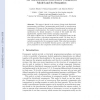Free Online Productivity Tools
i2Speak
i2Symbol
i2OCR
iTex2Img
iWeb2Print
iWeb2Shot
i2Type
iPdf2Split
iPdf2Merge
i2Bopomofo
i2Arabic
i2Style
i2Image
i2PDF
iLatex2Rtf
Sci2ools
104
click to vote
FMCO
2008
Springer
2008
Springer
An Asynchronous Distributed Component Model and Its Semantics
This paper is placed in the context of large scale distributed programming, providing a programming model based on asynchronous components. It focuses on the semantics of asynchronous invocations and component synchronisation. Our model is precise enough to enable the specification of a formal semantics. A variant of this model has been implemented, together with tools for managing components. This paper explains why we consider that our component model is efficient and provides a convenient programming model. We show how futures play a major role for such asynchronous components, and provide a reduction semantics for the component model. This reduction semantics has been specified in the Isabelle theorem prover, and will be used to prove properties on the component model and its implementations.
Related Content
| Added | 26 Oct 2010 |
| Updated | 26 Oct 2010 |
| Type | Conference |
| Year | 2008 |
| Where | FMCO |
| Authors | Ludovic Henrio, Florian Kammüller, Marcela Rivera |
Comments (0)

